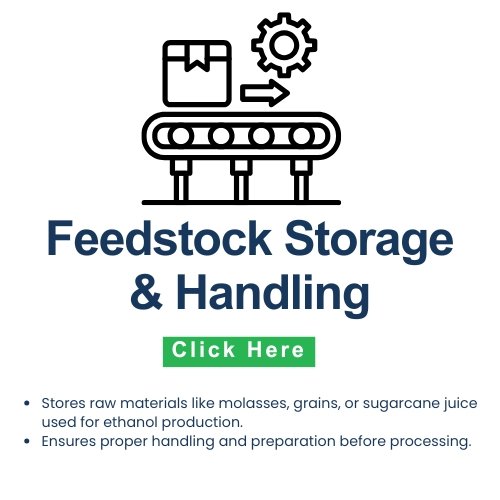Feedstock Storage & Handling: 5 Best Practices for Ethanol Production | Learn how to optimize feedstock storage, prevent spoilage, reduce waste, and improve efficiency in ethanol production.

Table of Contents
Introduction
In ethanol production, Feedstock Storage & Handling plays a critical role in ensuring a consistent, high-quality raw material supply. Efficient storage and handling prevent contamination, spoilage, and material loss while optimizing plant efficiency. Whether using corn, sugarcane, wheat, sorghum, cassava, or cellulosic materials, proper techniques can significantly impact ethanol yield and overall production costs.
This guide provides industry-proven best practices for effective Feedstock Storage & Handling, based on real-world experience in ethanol production.
1. Feedstock Storage: Protecting Quality & Reducing Losses
Proper storage ensures that feedstocks remain fresh, contamination-free, and ready for efficient processing. The choice of storage system depends on the type of feedstock and environmental conditions.
1.1. Storage of Starch-Based Feedstocks (Corn, Wheat, Sorghum, Cassava, etc.)
Starch-based crops are widely used in ethanol production due to their high fermentable sugar content. However, improper storage can lead to spoilage, mold, and insect infestations.
Grain Storage (Corn, Wheat, Sorghum):
- Stored in metal silos or concrete grain bins with aeration systems.
- Ideal moisture content: 13–15% to prevent fungal growth.
- Temperature control and aeration to prevent overheating and spoilage.
- Automated monitoring systems detect moisture and temperature fluctuations.
Cassava Storage:
- Highly perishable; fresh cassava must be processed within 48 hours.
- For long-term storage, cassava is dried and stored as chips or flour in moisture-proof containers.
- Rodent-proof storage prevents contamination and maintains quality.
1.2. Storage of Sugar-Based Feedstocks (Sugarcane, Sugar Beet, Molasses)
Sugar-based feedstocks are perishable and require immediate processing to prevent sugar loss.
Sugarcane & Sugar Beet Storage:
- Must be processed within 24–48 hours to prevent sucrose degradation.
- Stored in shaded, well-ventilated areas with minimal exposure to heat.
- Continuous transport to the processing plant via conveyor belts or trucks.
Molasses Storage:
- Stored in large steel or concrete tanks with temperature control to prevent crystallization.
- Sealed, contamination-free environments prevent microbial spoilage.
- Pumped through pipelines with filtration systems before fermentation.
1.3. Storage of Cellulosic Feedstocks (Corn Stover, Bagasse, Wood Chips, Switchgrass, etc.)
Cellulosic ethanol production relies on agricultural residues and energy crops, which require specialized storage solutions.
Baled Biomass Storage (Corn Stover, Straw, etc.):
- Stored in covered warehouses or outdoor stacks with waterproof tarps.
- Moisture content below 15% prevents microbial degradation.
- Aeration systems maintain proper airflow and prevent overheating.
Wood Chips & Energy Crops:
- Stored in piles, silos, or pelletized form for longer shelf life.
- Grinding and size reduction before storage improves handling efficiency.
- Automated feedstock tracking systems monitor quality over time.
2. Feedstock Handling: Ensuring Efficiency & Reducing Waste
Efficient Feedstock Storage & Handling reduces transportation costs, minimizes material loss, and ensures consistent processing. Handling methods vary based on feedstock type and plant infrastructure.
2.1. Starch-Based Feedstock Handling
- Corn, Wheat, Sorghum:
- Transported using conveyors, bucket elevators, or pneumatic systems.
- Dust control systems reduce material loss and fire hazards.
- Screening & cleaning units remove foreign debris before milling.
- Cassava Handling:
- Fresh cassava is manually or mechanically transported via belt conveyors.
- Dried cassava chips use pneumatic conveyors to feeding systems.
2.2. Sugar-Based Feedstock Handling
- Sugarcane & Sugar Beets:
- Transported via trucks, conveyor belts, or floating water channels (for beets).
- Choppers & shredders process feedstock before juice extraction.
- Automated waste collection repurposes bagasse for cogeneration.
- Molasses Handling:
- Pumped through heated pipelines to maintain viscosity.
- Filtration systems remove sediment before fermentation.
2.3. Cellulosic Feedstock Handling
- Baled Biomass (Corn Stover, Straw, etc.):
- Moved using forklifts, conveyors, or automated baling systems.
- Pre-shredding and grinding improve conversion efficiency.
- Wood Chips & Energy Crops:
- Transported via conveyors or augers to pretreatment units.
- Size reduction equipment ensures uniform feedstock processing.
3. Key Considerations for Efficient Feedstock Storage & Handling
To optimize Feedstock Storage & Handling, ethanol producers must focus on:
- Moisture Control: Prevents spoilage and microbial growth.
- Pest & Contamination Prevention: Regular fumigation and sealed storage solutions.
- Temperature & Humidity Regulation: Essential for grain and biomass storage.
- Automated Monitoring Systems: Reduces human error and enhances efficiency.
- Efficient Transportation Methods: Minimizes material loss and optimizes plant workflow.
To improve Feedstock Storage & Handling efficiency, check out these resources:
- U.S. Department of Agriculture (USDA) – Guidelines on crop storage and handling.
- Renewable Fuels Association (RFA) – Insights on ethanol production best practices.
- National Renewable Energy Laboratory (NREL) – Research on biofuel feedstock management.
These sources provide valuable industry knowledge to optimize ethanol production.
Proper Feedstock Storage & Handling is the backbone of efficient ethanol production. By implementing best practices for storage, transportation, and processing, ethanol producers can reduce waste, improve yield, and lower costs. Investing in modern storage technologies, automated handling systems, and real-time monitoring ensures that feedstock quality remains optimal throughout the production cycle.
With growing demand for biofuels, refining Feedstock Storage & Handling strategies is essential for sustainable, cost-effective ethanol production. By following these industry-tested methods, ethanol producers can stay competitive while maximizing operational efficiency.
Read More:




